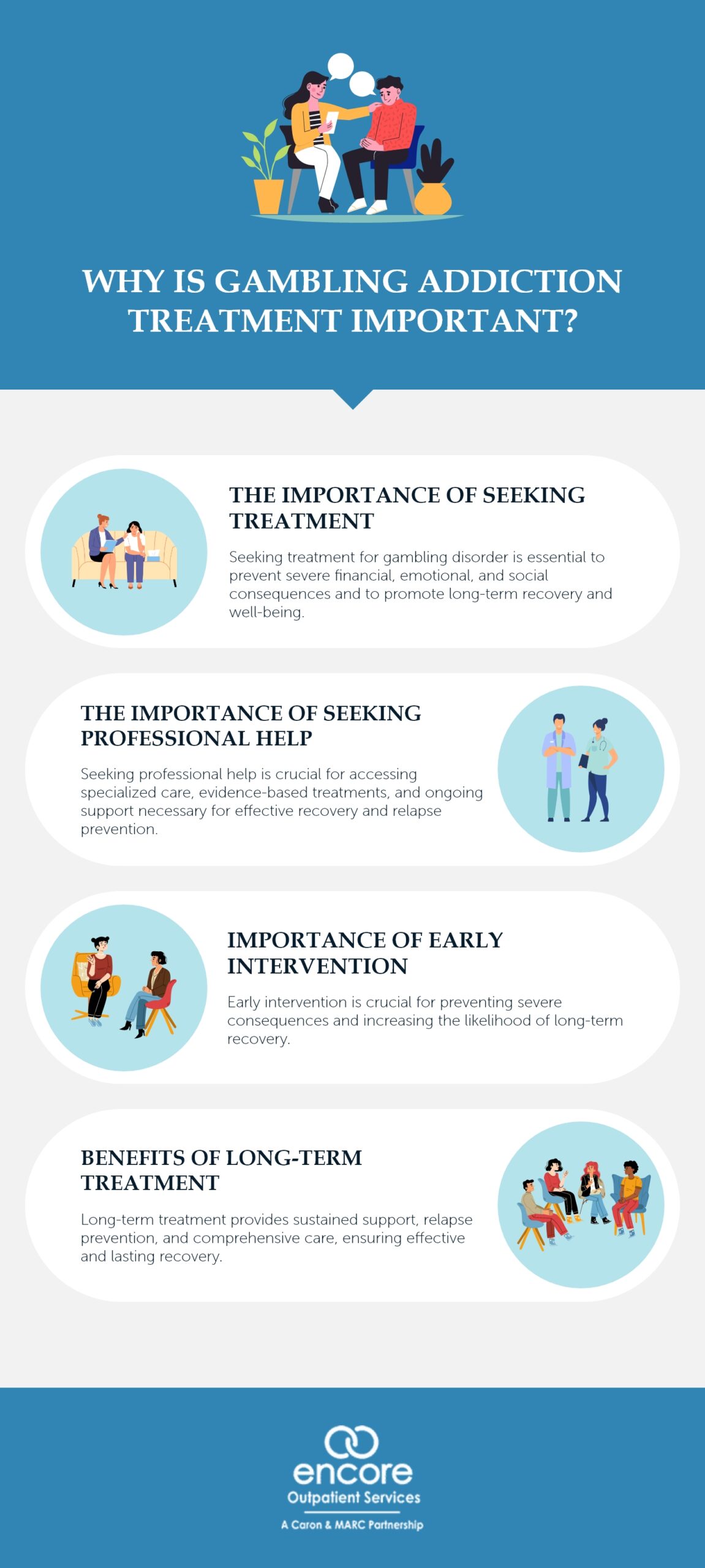Our dedication lies not just in treating symptoms but in addressing the root causes, offering a holistic approach that integrates the best of therapeutic practices with the warmth of community support.
Why Is Gambling Addiction Treatment Important?

Gambling addiction is a serious mental health condition that affects millions of people worldwide. Without proper treatment, it can lead to severe financial, emotional, and social consequences. Understanding the importance of treatment is crucial for those struggling with this condition and their loved ones. Let’s explore why gambling addiction treatment is necessary and how it can improve your life.
Understanding Gambling Addiction
Gambling addiction, also known as gambling disorder, is characterized by an uncontrollable urge to gamble despite the negative consequences it may cause. It’s a recognized mental health condition classified under the category of behavioral addictions.
Key signs of gambling addiction include:
- Preoccupation with gambling activities
- The urge to gamble with increasing amounts of money
- Repeated unsuccessful attempts to stop or control gambling behavior
Psychologically, gambling addiction shares similarities with substance use disorders. It activates the brain’s reward system, releasing dopamine and creating a feeling of euphoria that reinforces the behavior. Over time, you develop tolerance, requiring more frequent or higher-stakes gambling to achieve the same effects.
Recognizing gambling disorder as a serious condition that requires professional help is the first step to overcoming it.
Risk Factors of Gambling Addiction
Several factors can increase the risk of developing a gambling addiction. Key risk factors include:
- Genetic Predisposition: A family history of gambling addiction or other addictions can increase susceptibility.
- Mental Health Disorders: Conditions such as depression, anxiety, and substance use disorders are often associated with a higher risk of gambling addiction.
- Personality Traits: Traits such as impulsivity and a propensity for risky behavior can contribute to gambling addiction.
- Early Exposure: Early exposure to gambling, especially during adolescence, can increase the likelihood of developing a gambling problem later in life.
- Accessibility: Easy access to gambling venues or online gambling platforms can increase the risk of addiction.
- Environmental Factors: Being in a social environment where gambling is normalized or encouraged can contribute to the development of gambling addiction.
- Unresolved Trauma: Some people turn to gambling as an escape from past trauma or unresolved emotional problems.
Identifying those at risk and implementing preventive measures can reduce the risk of gambling addiction.

Consequences of Untreated Gambling Disorder
Untreated gambling disorder can impact various aspects of your life. Key consequences include:
- Financial Issues: Accumulation of significant debt, bankruptcy, and financial instability due to persistent gambling losses.
- Mental Health Challenges: Increased risk of mood disorders and chronic stress can exacerbate your dependence and lead to severe emotional distress.
- Substance Use Disorders: Untreated gambling disorder can increase the risk of substance use disorders.
- Relationship Strain: Strained or broken relationships with family, friends, and partners due to dishonesty, secrecy, and neglect of responsibilities.
- Occupational Impacts: Decreased job performance, loss of employment, and difficulties maintaining a stable career due to gambling activities.
- Legal Problems: Involvement in illegal activities to fund gambling habits, leading to potential legal challenges and criminal charges.
- Physical Health Decline: Neglect of personal health, resulting in physical ailments such as insomnia, headaches, cardiovascular diseases, and gastrointestinal issues.
- Social Isolation: Withdrawal from social interactions and activities, leading to increased feelings of loneliness and isolation.
Understanding these consequences underscores the importance of seeking timely treatment for gambling addiction.
The Importance of Seeking Treatment
Seeking treatment for gambling addiction is crucial for several reasons:
- Mental Health Improvement: Treatment helps address underlying mental health conditions such as anxiety, depression, and chronic stress, promoting overall emotional well-being.
- Financial Recovery: Professional guidance can assist in managing finances, reducing debt, and achieving financial stability.
- Relationship Restoration: Therapy can help repair strained relationships with family and friends, fostering a supportive environment for wellness.
- Occupational Stability: Effective treatment can improve job performance and career stability by reducing your preoccupation with gambling.
- Physical Health Benefits: Addressing addiction can lead to better physical health by reducing stress-related ailments and encouraging healthier lifestyle choices.
- Social Reconnection: Seeking treatment helps you better engage with society, reduce isolation, and build a strong support network.
Overcoming gambling addiction can help you lead a healthier, more stable life.
The Importance of Seeking Professional Help
Seeking professional treatment for gambling addiction is crucial for several reasons:
- Expert Guidance: Professional treatment provides access to trained therapists who specialize in gambling addiction and can offer evidence-based interventions.
- Structured Environment: Treatment programs offer a structured environment that helps you focus without distractions or triggers.
- Personalized Care: Treatment plans are tailored to meet your specific needs, addressing underlying issues and co-occurring disorders.
- Professional Support: Professional treatment includes support from a team of mental health professionals, which is essential for long-term wellness.
- Comprehensive Approach: Treatment often includes a combination of therapies.
- Better Outcomes: Addressing gambling addiction with professional help can lead to better mental health outcomes.
- Long-Term Recovery: Ongoing professional support ensures you have the tools and resources needed to sustain a gambling-free life.
Seeking professional help is essential for accessing effective treatments.
Types of Gambling Addiction Treatment
There are several effective types of gambling disorder treatment:
- Cognitive-Behavioral Therapy (CBT): CBT helps you identify and change unhealthy thought patterns and behaviors that maintain problem gambling. It focuses on developing coping strategies and problem-solving skills.
- Exposure Therapy: This behavioral therapy aims to help reduce gambling urges and cravings by gradually exposing you to gambling-related cues and stimuli in a controlled environment.
- Mindfulness-Based Therapies: Mindfulness-based interventions can be effective in reducing gambling behavior and symptoms of gambling disorder.
- Art Therapy: By exploring triggers, developing coping strategies, addressing emotional challenges, and boosting motivation, art therapy can complement other evidence-based interventions.
- Nature-Based Therapy: The use of calming natural sounds can help manage gambling disorder by reducing stress, promoting relaxation, and providing a healthy alternative to gambling.
- Family Therapy: Involving family members in therapy sessions can help repair relationships, improve communication, and create a supportive home environment conducive to long-term wellness.
- Support Groups: Programs like Gamblers Anonymous provide a supportive community where you can share experiences, receive encouragement, and gain insights from others facing similar challenges.
- Pharmacological Interventions: Certain medications can help manage symptoms of co-occurring mental health disorders that often accompany gambling addiction.
- Inpatient Treatment Facilities: Residential or inpatient programs provide a structured environment where you can focus on healing without the distractions and triggers of everyday life.
- Outpatient Treatment Facilities: These programs offer flexibility, allowing individuals to receive treatment while continuing with their daily responsibilities. They include regular therapy sessions and support group meetings.
Understanding your options can help you and your loved ones choose the most appropriate path to wellness.
Importance of Early Intervention
Early intervention is crucial for effectively managing gambling disorder and minimizing its negative effects. Here are a few key reasons why:
- Preventing Severe Consequences: Gambling disorder can worsen over time if left untreated. Addressing the problem early can help prevent the condition and its consequences from escalating.
- Better Treatment Outcomes: Early treatment increases the likelihood of long-term wellness and reduces the duration and intensity of treatment needed.
- Reduced Burden: Early interventions reduce the overall burden of the condition on individuals, families, and society as a whole.
- Protecting Mental Health: Early intervention helps address co-occurring mental health disorders before they become severe.
- Maintaining Relationships: Timely intervention can prevent the deterioration of personal relationships.
- Enhancing Quality of Life: Early intervention allows you to regain control of your life sooner, improving overall well-being and life satisfaction.
Early intervention is essential for effectively managing gambling disorder.
Benefits of Long-Term Treatment
Long-term treatment of gambling disorder is essential for several reasons:
- Sustained Recovery: Long-term treatment helps maintain recovery by providing continuous support and reinforcement of coping strategies.
- Relapse Prevention: Ongoing treatment reduces the risk of relapse by helping you manage triggers and stressors effectively.
- Comprehensive Care: Long-term treatment addresses both the immediate and underlying conditions, ensuring a holistic treatment approach.
- Building Coping Skills: Developing effective coping strategies takes time. Long-term treatment provides the opportunity to practice these skills and build resilience.
- Maintaining Motivation: Overcoming gambling addiction requires sustained motivation and commitment. Prolonged treatment helps maintain this motivation.
- Accountability: Regular follow-up sessions and ongoing support groups provide accountability, helping you stay committed to your treatment goals.
- Restoring Functioning: Long-term treatment is necessary to restore daily functioning and improve overall quality of life.
- Adaptation to Life Changes: Long-term treatment helps individuals adapt to challenges without resorting to gambling habits.
Long-term treatment highlights the need for sustained effort and support in achieving and maintaining recovery from gambling addiction.
If you or a loved one is struggling with gambling addiction, Encore Outpatient Services can provide the comprehensive support and treatment you need. Our dedicated team offers various programs, including partial hospitalization, intensive outpatient, and general outpatient care, tailored to meet individual needs.
Take the first step towards a healthier, happier life with Encore Outpatient Services. Contact us today to learn more about our programs and how we can help.
Let Us Support You On Your Recovery Journey!
Copyright 2025 Encore Outpatient Services | All Rights Reserved



